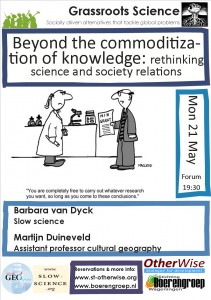Rethinking science and society relations
Barbara van Dyck (Slow Science, fired at Catholic University of Leuven due to involvement in public protest against a Genetically Modified Potato field)
Martijn Duineveld (assistant professor Cultural Geography)
“Research on bees paid by the pesticide industry showing that it was not the pesticide that kills them…” (Zembla reportage, 12 maart 2011) “Research by dairy industry showing that milk is healthy…” (Resource, November 2010) “Researcher of architecture at the Catholic University of Leuven (Belgium) was fired because she supported a civil protest against the undemocratic imposing of genetically modified into society” (de Wereld Morgen, 4 Juni 2011)
The relation between science and industry sometimes seems a love affair. What does this mean for society? What interest does science serve? Who poses the questions to be answered? On Monday May 21, Barbara van Dyck presented “Slow Science germs sprouting from a potato field ” (see also their two blogs: one blog is about the dismissal of Barbara van Dyck at the University of Leuven and the other blog is about how gm potatoes were introduced).
Martijn Duineveld spoke about “Potato Heads, nobody’s perfect: knowledge and power in the information age”. Click hier inschrijven for an essay written by Martijn Duineveld
For dutch readers:
Van harte raad ik u het boekje Doing Things with Varkens and Words aan, waarin Martijn Duineveld analyseert hoe voor- en tegenstanders in grootschalige veehouderij argumenten en redeneer-kunsten gebruiken. Ik haal eruit dat: de ene groep (on?)bewust de andere marginaliseert (in kast wegzet als “emotioneel” en dus onrealistisch), en de andere groep soms niet meer weet waar haar pijlen op te richten. Of is dit onduidelijkheid scheppen in verantwoordelijkheden misschien ook een (on?)bewuste machtstechniek? Het komt velen natuurlijk wel heel goed uit….
door Klarien Klingen

